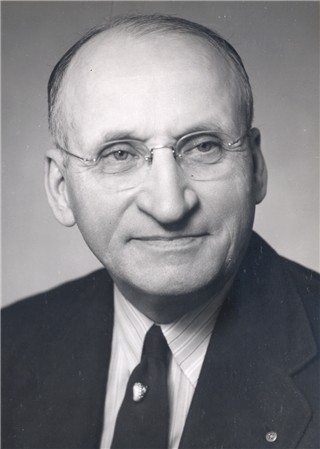

The
Joseph A. Caulder Collection
Past Rotary International Director 1928-29
- Regina, Sask., Canada
"Eyewitness to Rotary International's First 50 Years"
JOSEPH A. CAULDER - An eyewitness to Rotary International's first 50 years.
Album 1 - Pages 133-34: Arthur Frederick Sheldon
|
Internal Links
|
[Clink on Image to Enlarge]
Arthur Frederick
for the Sheldon Collection at the Kingston Public Library |
|
|
|
 |
|
|
Letter from Chesley R. Perry to Leland D. Case, former Editor of The Rotarian. 30 June 1952 Dear Leland: I'll do will do I can to help you with the Sheldon story. It is amusing to hear from time to time about Charley's iconoclastic proclivities. Of course Sheldon didn't originate the philosophic conception contained in the second part of the motto - some Roman or Greek or Hebrew or Assyrian did that thousands .of years ago. But so far as Rotary is concerned Sheldon certainly was the first to give us the phrase He Profits most who serves best. I heard him use it at the final dinner session of the 1910 (first) Rotary convention. I had read it before in the Sheldon School literature. I heard him tell how the phrase took shape in his mind while he was sitting in a barber's chair in St. Paul. He used it again in his Business Methods Committee report in the second convention at Portland, Oregon (which in his absence I read to the convention.) The Convention was preparing to adopt a carefully drafted statement about Rotary (which became known as the Rotary Platform) when someone called attention to a sentence in the Sheldon report which he thought should be added to the Platform and the suggestion was unanimously and heartily approved. Sheldon came into the Chicago Club in January 1908 while it was still the only Rotary Club,. He was a philosopher who believed that business was service with definite responsibility to society but that meeting such responsibility did not require any serious sacrifice and had its certain rewards. About that time Paul was somewhat discouraged about the future of the Chicago Club but Sheldon and Paul had many conferences and became great friends. Enheartened by Sheldon's companionship Paul got his second wind and dreamed of broader and greater Rotary accomplishments. He began to suggest the idea to men in other cities. (See pp. 233-34 & 238 of "My Road to Rotary". During 1908, 09, 10 Sheldon may not have appeared very active in the Chicago Club, may not have joined in the hilarities of those early days, but he exerted a real and lasting influence in the development and expression of the Rotary ideal of service. (En passant there are those who not having participated in that phase of Rotary cannot recall that anything of the sort happened). With reference to Sheldon's influence upon those who took his course bear in mind that hundreds if not thousands of Sheldon School graduates became such long before Sheldon became a Rotarian. Consequently in many cities were found as prospective Rotarians men who had much earlier absorbed the Sheldon philosophy. I'm enclosing copy of something that was prepared a couple of years ago for a Sheldon memorial service down in New York State. It may be that you can get a copy of the entire service. If you have the 1921 (Edinburgh) convention proceedings it would be well for you to read Sheldon's message to the Convention. Best wishes,
|
|
|
Copyright© Daniel W. Mooers |
Rotary® and Rotary International® are registered trademarks of Rotary International Webmaster: dwm@mooers-law.com |